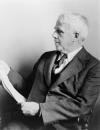I've known ere now an interfering branch
Of alder catch my lifted ax behind me.
But that was in the woods, to hold my hand
From striking at another alder's roots,
And that was, as I say, an alder branch.
This was a man, Baptiste, who stole one day
Behind me on the snow in my own yard
Where I was working at the chopping block,
And cutting nothing not cut down already.
He caught my ax expertly on the rise,
When all my strength put forth was in his favor,
Held it a moment where it was, to calm me,
Then took it from me and I let him take it.
I didn't know him well enough to know
What it was all about. There might be something
He had in mind to say to a bad neighbor
He might prefer to say to him disarmed.
But all he had to tell me in French-English
Was what he thought of not me, but my ax;
Me only as I took my ax to heart.
It was the bad ax-helve some one had sold me
Made on machine,' he said, plowing the grain
With a thick thumbnail to show how it ran
Across the handle's long-drawn serpentine,
Like the two strokes across a dollar sign.
You give her 'one good crack, she's snap raght off.
Den where's your hax-ead flying t'rough de hair?
Admitted; and yet, what was that to him?
Come on my house and I put you one in
What's las' awhile good hick'ry what's grow crooked,
De second growt' I cut myselftough, tough!
Something to sell? That wasn't how it sounded.
Den when you say you come? It's cost you nothing.
To-naght?
As well to-night as any night.
Beyond an over-warmth of kitchen stove
My welcome differed from no other welcome.
Baptiste knew best why I was where I was.
So long as he would leave enough unsaid,
I shouldn't mind his being overjoyed
(If overjoyed he was) at having got me
Where I must judge if what he knew about an ax
That not everybody else knew was to count
For nothing in the measure of a neighbor.
Hard if, though cast away for life with Yankees,
A Frenchman couldn't get his human rating!
Mrs. Baptiste came in and rocked a chair
That had as many motions as the world:
One back and forward, in and out of shadow,
That got her nowhere; one more gradual,
Sideways, that would have run her on the stove
In time, had she not realized her danger
And caught herself up bodily, chair and all,
And set herself back where she ,started from.
She ain't spick too much Henglish dat's too bad.
I was afraid, in brightening first on me,
Then on Baptiste, as if she understood
What passed between us, she was only reigning.
Baptiste was anxious for her; but no more
Than for himself, so placed he couldn't hope
To keep his bargain of the morning with me
In time to keep me from suspecting him
Of really never having meant to keep it.
Needlessly soon he had his ax-helves out,
A quiverful to choose from, since he wished me
To have the best he had, or had to spare
Not for me to ask which, when what he took
Had beauties he had to point me out at length
To ensure their not being wasted on me.
He liked to have it slender as a whipstock,
Free from the least knot, equal to the strain
Of bending like a sword across the knee.
He showed me that the lines of a good helve
Were native to the grain before the knife
Expressed them, and its curves were no false curves
Put on it from without. And there its strength lay
For the hard work. He chafed its long white body
From end to end with his rough hand shut round it.
He tried it at the eye-hold in the ax-head.
Hahn, hahn, he mused, don't need much taking down.
Baptiste knew how to make a short job long
For love of it, and yet not waste time either.
Do you know, what we talked about was knowledge?
Baptiste on his defense about the children
He kept from school, or did his best to keep
Whatever school and children and our doubts
Of laid-on education had to do
With the curves of his ax-helves and his having
Used these unscrupulously to bring me
To see for once the inside of his house.
Was I desired in friendship, partly as someone
To leave it to, whether the right to hold
Such doubts of education should depend
Upon the education of those who held them.
But now he brushed the shavings from his knee
And stood the ax there on its horse's hoof,
Erect, but not without its waves, as when
The snake stood up for evil in the Garden
Top-heavy with a heaviness his short,
Thick hand made light of, steel-blue chin drawn down
And in a little a French touch in that.
Baptiste drew back and squinted at it, pleased:
See how she's cock her head!







